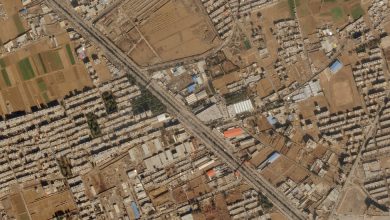New York Officials Fear Supreme Court Ruling Will Mean More Gun Crime

Every weekday morning in a nondescript office building in downtown Manhattan, representatives from dozens of law enforcement agencies meet to discuss gun arrests and shootings in New York City from the day before.
Already this year, the New York Police Department has recovered more than 3,000 guns, and such arrests have hit a 28-year-high. But across the city and state, authorities are bracing for a ruling, expected from the United States Supreme Court this month, which could strike down a century-old New York State law that places strict limits on the carrying of handguns.
Overturning the law could make it far easier to legally carry a handgun in the state, which officials say may have violent consequences for cities already struggling to tamp down a spike in gun crime that began two years ago.
“A lot more people are going to now want to go out and get guns. And for all the wrong reasons,” said Richard Aborn, the president of the nonprofit Citizens Crime Commission. “I have people telling me they decided to get a gun that I never dreamed would go out and get a gun. They’re not going to use it illegally but they’re feeling this need to arm themselves in a way that I’ve not seen before.”
And if more New Yorkers are armed, he said, what would otherwise have been minor confrontations could turn deadly.
When the Supreme Court heard arguments over the law in November, a number of justices appeared predisposed against it, leading experts to believe that the law is likely to be struck down. If that happens, the ramifications could reach beyond New York: A handful of other states, including California, Connecticut, Maryland and Massachusetts, have similar laws that could also be invalidated.
New York State requires anyone who wants to purchase a handgun to apply for a state license. But there is an additional level of scrutiny for people who want a license that allows them to carry their gun outside their home. The two petitioners before the Supreme Court, both upstate New Yorkers, are challenging the laws governing the carrying of handguns, though gun control advocates in the state worry that the rules for acquiring handguns will be next.
Twenty-five states now allow their citizens to carry guns without a permit. The majority of those laws have passed in the last decade, and a number have passed in the last two years, including those in Ohio and Georgia.
In New York, Gov. Kathy Hochul has said that she would consider calling a special session of the State Legislature if the law were overturned. And after a shooting in Buffalo last month in which a teenager motivated by racism killed 10 Black people at a grocery store, she brought up the law unprompted, saying that her administration was “preparing our state for what could be a Supreme Court decision that allows people to carry concealed weapons. We’re ready.”
A spokeswoman for the governor declined to elaborate further on the preparations.
Local officials are also readying their offices. On Tuesday, Mayor Eric Adams said that in preparation, he and others were looking to draft legislation on the federal, state and local levels, adding that the impending ruling keeps him “up at night.”
And last week, the Manhattan district attorney, Alvin L. Bragg, sent an email to his prosecutors saying that his team was planning to work with Ms. Hochul, Mr. Adams and other district attorneys on new legislation to “protect New Yorkers and withstand legal challenge.”
He said that the office was planning for a potential storm of litigation should the law be overturned, including lawyers filing motions to dismiss gun possession indictments and even convictions.
“If the Supreme Court does issue the type of opinion that many predict, we will have to innovate and adapt to meet the new public safety challenges that the decision may pose — and we will,” Mr. Bragg’s email said.
Under the law being challenged, it is illegal to carry a handgun openly, and a permit is required to carry one concealed. Such permits require a showing of “proper cause,” which requires applicants to demonstrate to courts or the local police that they have a heightened need to carry a gun. It is then up to those officials to determine whether or not the applicant will be issued a permit — a process that the lawyers for the upstate New Yorkers challenged in a case that made its way to the Supreme Court.
If the court strikes down the law, it is highly likely that New York would respond by crafting a new measure that meets the specifications of the ruling.
“Everything depends on the breadth of the court’s decision and the grounds for why the law is unconstitutional,” said Joseph Blocher, a Second Amendment expert at Duke University School of Law.
The court could rule that the current standard is too strict, requiring New York to loosen its standards; or that it is too vague, compelling the state to give more guidance for licensing officials. “Those are two different kinds of potential constitutional problem that would call for two different kinds of response from the legislature,” Mr. Blocher said. And depending on what the justices say, it may still be possible to place significant restrictions on the carrying of guns in New York City.
In New York State, licenses to carry handguns are approved or denied by local officials, usually state court judges or police departments. In New York City, the police department handles all such permitting.
While the state court system does not keep a centralized database of how many licenses are approved or denied, they are typically easier to obtain in rural areas than in cities, according to New York’s solicitor general, Barbara D. Underwood, who argued the state’s case in front of the Supreme Court.
But those calling for the law to be struck down have said that it grants local officials too much discretion. “New York’s concerns are unfounded and violate our rights, and leave New Yorkers disarmed in the face of evil,” said Aidan Johnston, the director of federal affairs for Gun Owners of America, a pro-gun lobbying group.
Asked about data like that from Everytown for Gun Safety, a gun control advocacy group, that shows a correlation between the weakening of gun laws and higher rates of murders and suicides, Mr. Johnston said that there was no demonstrable relationship between the two. He argued that New York City has “a crime problem, not a Second Amendment problem.”
In New York’s cities, and in many around the country, shootings and other forms of gun crime rose sharply beginning in the summer of 2020, and law enforcement authorities have said that the prospect of more New Yorkers carrying guns would likely increase the difficulty of already difficult jobs.
“When a police officer stops a person with a gun in view, now they have to ask themselves a question,” said John Miller, the police department’s deputy commissioner of intelligence and counterterrorism. “What’s the difference between the person who is going to be shooting at me and the person who is going to be a pulling a permit out of their wallet?”
Research shows that guns used in crimes in New York City tend not to be owned legally, but are often purchased legally in other states before being smuggled into the city. But Mr. Miller said that the increased purchase of guns that could result from the Supreme Court ruling would likely mean more theft of guns from cars and homes. That trend has been observed in other states that have loosened carrying laws, he said.
At the same time, he said, guns purchased legally in New York may come to be used in crimes more often, because the people who use them no longer need to travel to obtain them. “When the crime guns start to be from here, that’s going to be a byproduct of that kind of change in the law,” he said.
Chanelle Anderson, a 33-year-old violence “interrupter” who works with the nonprofit BronxConnect to intervene in potential conflicts, said that greater access to guns would likely increase the number of shootings and the number of people sent to jail or prison.
“If they legalize firearms, that’s making it easier to destroy our communities even more,” she said.
Even if a change required by the Supreme Court’s ruling is relatively minor, confusion could still reign in the immediate aftermath of a published decision. Mr. Aborn said he was hoping that Mr. Adams and the five city district attorneys stress to the public, should there be changes to the law, that background checks and licenses would still be required to acquire guns.
“People are going to misinterpret whatever the decision is and immediately assume that any gun they have now, even if it’s an illegal gun, suddenly becomes a legal gun,” he said.




